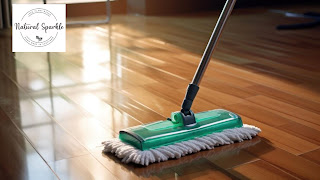The Ultimate Guide to Homemade, Organic, and Non-Toxic Bathroom Cleaners in the UK
Keeping your bathroom clean and fresh can be challenging, especially if you’re committed to using eco-friendly and non-toxic products. With increasing awareness about the harmful effects of conventional cleaning products, many people are turning to homemade, organic, and non-toxic alternatives. This guide will explore these options and provide insights into why they are beneficial, along with practical tips on making and using them.
Why Choose Homemade, Organic, and Non-Toxic Bathroom Cleaners?
Health and Safety
Traditional Bathroom Cleaners often contain harsh chemicals such as bleach, ammonia, and synthetic fragrances, which can cause respiratory issues, skin irritations, and other health problems.
On the other hand, homemade, organic, and non-toxic cleaners use natural ingredients that are generally gentler on the skin and less likely to cause adverse reactions. Switching to these alternatives creates a safer environment for your family and yourself.
Environmental Impact
Many conventional cleaning products contribute to environmental pollution by releasing volatile organic compounds (VOCs) and using non-biodegradable ingredients.
Homemade and organic cleaners often use biodegradable ingredients with a minimal ecological footprint This helps minimise pollution and preserve natural resources.
Cost-Effectiveness
Homemade cleaners can be significantly cheaper than store-bought options. You can create effective Cleaning Solutions without spending a fortune using common household ingredients such as vinegar, baking soda, and lemon juice.Additionally, these ingredients are versatile and can be used for multiple cleaning tasks around the home.
Homemade Bathroom Cleaners
Homemade bathroom cleaners are a fantastic way to ensure you know exactly what goes into your cleaning products. Here are a few key ingredients often used in homemade recipes:
White Vinegar: A natural disinfectant that cuts through grime and dissolves mineral deposits.
Baking Soda: A gentle abrasive that assists in removing stains and neutralising odours.
Lemon Juice: Its natural acidity helps cut through grease and provides a fresh scent.
Essential Oils: These add a pleasant fragrance and have antibacterial properties. Popular options include tea tree, lavender, and eucalyptus.
Benefits: Homemade cleaners are tailored to your specific needs and preferences. You can adjust the strength and scent of your cleaner to suit your tastes, and you can avoid synthetic additives altogether.
Organic Bathroom Cleaners
Organic Bathroom Cleaners are formulated with natural, plant-based ingredients free from synthetic chemicals. These products are often certified by organizations that ensure they meet specific organic standards.
Key Ingredients in Organic Cleaners:
Plant-Based Surfactants: Derived from natural sources like coconut or palm oil, these help to break down grease and dirt.
Natural Essential Oils: These oils often have antimicrobial properties besides their pleasant fragrance.
Organic Acids: Citric acid from citrus fruits helps dissolve limescale and other deposits.
Benefits: Organic cleaners are an excellent choice for those looking to minimize their exposure to synthetic chemicals while maintaining a high cleaning efficacy. They are also often biodegradable and come in eco-friendly packaging.
Non-Toxic Bathroom Cleaners
Non-toxic cleaners are designed to be free of harmful chemicals that can harm health. They are an excellent choice for households with young children or pets.
Key Characteristics:
Free From Harmful Chemicals: Non-toxic cleaners do not contain ingredients such as ammonia, chlorine bleach, or phthalates.
Low or No Fragrance: They use natural scents or are fragrance-free, reducing the risk of allergic reactions and respiratory issues.
Safe Ingredients: Ingredients are generally food-grade or have been proven safe for direct contact with skin and mucous membranes.
Benefits: Choosing non-toxic cleaners helps ensure a safer living environment by reducing exposure to potentially harmful substances. They are particularly suitable for people with allergies, asthma, or other respiratory conditions.
How to Use Homemade, Organic, and Non-Toxic Bathroom Cleaners Effectively
Please read Instructions Carefully: Even though homemade, organic, and non-toxic cleaners are generally safer, it’s essential to follow any usage instructions to maximize their effectiveness.
Test Surfaces First: Before using a cleaner on a large area, test it on a small, inconspicuous spot to ensure it doesn’t damage or discolor the surface
Regular Cleaning: Consistency is critical to maintaining a clean bathroom. Use these cleaners regularly to prevent the build-up of grime and bacteria.
Proper Storage: Store your homemade cleaners in labeled containers away from direct sunlight and extreme temperatures to maintain effectiveness.
Ventilation: Ensure good ventilation when using any cleaner, even those made with natural ingredients, to avoid any buildup of fumes.
Opting for homemade, organic, and non-toxic bathroom cleaners is a proactive step towards a healthier home and environment. These alternatives offer a safer choice for your family and the planet without compromising on cleaning power.
Whether you prefer crafting your cleaners from everyday kitchen staples, choosing products with organic certifications, or selecting those with non-toxic labels, you can enjoy a sparkling clean bathroom with peace of mind.




Comments
Post a Comment